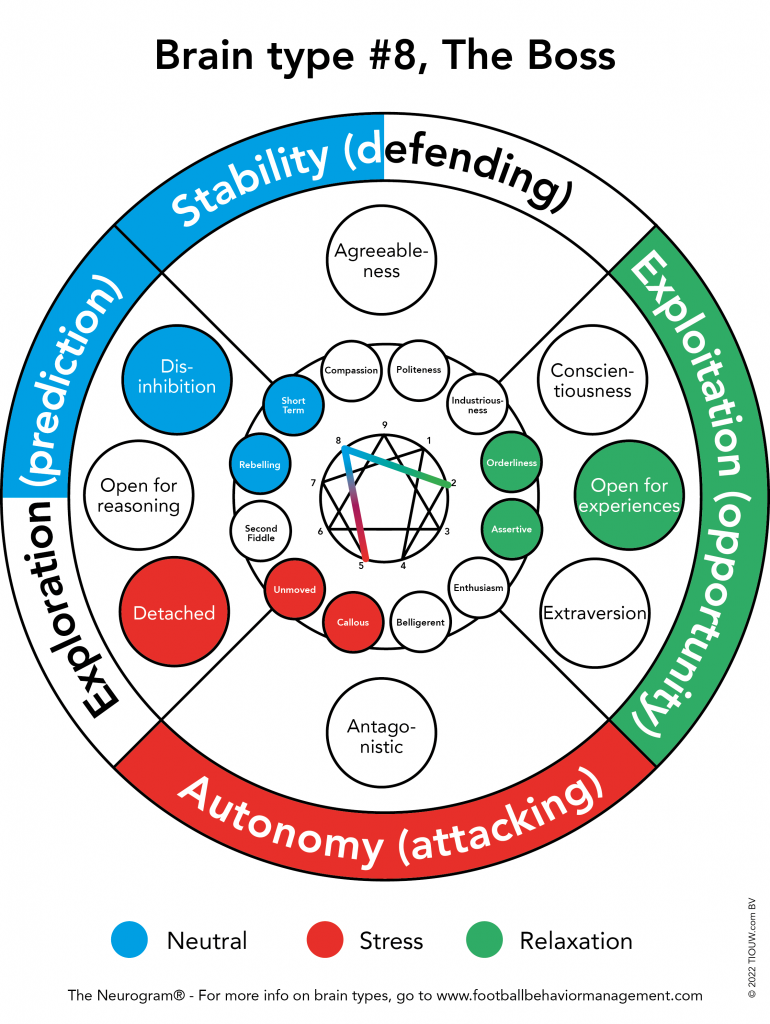
Exploration
In football, a player’s ability to explore can be seen in their creativity, versatility, risk-taking, and ability to exploit new spaces on the pitch. Luis Suarez, a Uruguayan professional footballer known for his impressive goal-scoring ability and offensive tactics. He scores high on Exploration for several reasons:
- Creativity: Suarez is known for his ability to create scoring opportunities out of difficult situations. His unpredictability and inventiveness make him a constant threat to opponents.
- Versatility: Suarez has demonstrated his ability to play in various attacking roles, whether as a lone striker, in a partnership, or out wide as part of a front three. This adaptability allows him to explore different areas of the pitch and different ways of contributing to the team’s attack.
- Risk-Taking: Suarez is known for his audacious style of play, often attempting and pulling off maneuvers that other players might not. This includes long-range shots, cheeky nutmegs, and daring dribbles.
- Exploiting Spaces: Suarez’s movement off the ball is exceptional. He consistently finds and exploits spaces in the opposition’s defense, making smart runs that pull defenders out of position and open up channels for his teammates.
- Technical Skills: Suarez’s excellent ball control, dribbling, and finishing ability allow him to navigate tight spaces and take on multiple defenders, further demonstrating his explorative style of play.
Social Stability
“Social Stability” in a football context could refer to a player’s ability to maintain consistent and positive interactions with teammates, coaches, and others in the football community. It may also involve the ability to handle pressure, maintain discipline, and adapt to different social environments.
Here’s why Luis Suarez scores high on Social Stability:
- Team Dynamics: Suarez has shown the ability to integrate well into different teams, from Liverpool to Barcelona, and then to Atletico Madrid. His strong relationships with teammates are evident in his on-pitch interactions and off-pitch camaraderie.
- Leadership: Suarez has often demonstrated leadership qualities on the pitch, guiding younger players and stepping up in crucial moments. This shows his stability and reliability as a team member.
- Handling Pressure: Suarez has played at the highest levels of football and performed exceptionally well. His ability to perform consistently, even under intense pressure, signifies a degree of emotional stability.
- Adaptability: Suarez has adapted to different leagues, styles of play, and cultures throughout his career – from Uruguay to the Netherlands, England, Spain, and now Italy. This adaptability indicates a high level of social stability.
- Discipline: Despite some notable exceptions, Suarez generally maintains discipline on the field, staying focused on the game and his role within the team.
Disinhibition
In the context of football, “Disinhibition” could refer to a player’s tendency to behave impulsively, take risks, and defy conventions or rules. It could also be associated with a lack of restraint or self-control.
Luis Suarez scores high on “Disinhibition” for several reasons:
- Risk-Taking: Suarez is known for his audacious style of play. He often attempts risky maneuvers, like long-range shots, unexpected dribbles, and complex tricks, showing a lack of inhibition in his play.
- Impulsivity: Suarez has had notable incidents in his career that show a degree of impulsivity and lack of self-control. The most famous of these are the biting incidents, where Suarez bit opponents during matches on three separate occasions.
- Rule-Breaking: Suarez’s handball in the 2010 World Cup quarterfinals against Ghana is another example of disinhibition. In the last minute of extra time, Suarez deliberately handled the ball to prevent it from going into the net, breaking the rules to keep his team in the competition.
- Emotional Outbursts: Suarez is known for his passionate and sometimes explosive reactions on the field, further demonstrating a tendency towards disinhibition.
While these aspects of disinhibition have sometimes led to controversy and disciplinary action, they also contribute to the unpredictability and audaciousness that make Suarez such an effective and exciting player.
Rebelling
In a football context, “Rebelling” can be viewed as a player’s tendency to resist authority, break rules, or challenge the status quo. Luis Suarez scores high on “Rebelling” for the following reasons:
- Rule-Breaking: Suarez has been involved in several high-profile incidents that broke the rules of the game, most notably his deliberate handball in the 2010 World Cup quarterfinals against Ghana and his biting incidents. These actions could be seen as forms of rebelling against the established rules of the sport.
- Confrontations: Suarez has had numerous confrontations with opponents on the pitch. He’s not one to back down when challenged, and his passionate and aggressive style of play often leads to clashes with other players.
- Challenging Authority: Suarez has had his share of disagreements with referees and footballing authorities over his career, with several instances of dissent or protest against decisions he disagreed with.
- Controversy: Suarez has been a controversial figure in football due to his on-pitch behavior and off-pitch incidents. This controversial reputation could be seen as a form of rebelling against societal expectations or norms.
Impulsivity
Impulsivity, in the context of football, can be described as a player’s tendency to act quickly and without much consideration of potential consequences. It’s often associated with rapid decision-making, risk-taking, and occasionally, unpredictability.
Luis Suarez scores high on “Impulsivity” due to the following reasons:
- Rapid Decision-Making: Suarez is known for his ability to make quick decisions in high-pressure situations, such as taking shots from difficult angles or attempting an unexpected dribble. This rapid decision-making, while often advantageous, can also be viewed as a form of impulsivity.
- Risk-Taking: Suarez often takes risks on the field, whether that’s attempting a difficult shot, making a daring run, or trying to dribble past multiple defenders. While these risks often pay off, they can also be seen as impulsive actions.
- Unpredictability: Suarez’s playing style is unpredictable and can catch opponents off guard. This unpredictability could be partly attributed to impulsivity.
- Disciplinary Issues: Suarez has been involved in several notable incidents that could be attributed to impulsivity, including biting opponents on three separate occasions and the deliberate handball in the 2010 World Cup. These actions show a lack of restraint and consideration of consequences, which are hallmarks of impulsivity.
While Suarez’s impulsivity has sometimes led to controversy, it’s also a key part of his playing style and effectiveness on the pitch. His quick decision-making, risk-taking, and unpredictability often give him an advantage over opponents and make him a dynamic and exciting player to watch. However, the downsides of impulsivity, such as disciplinary issues, are also evident in Suarez’s career.

Leave a Reply